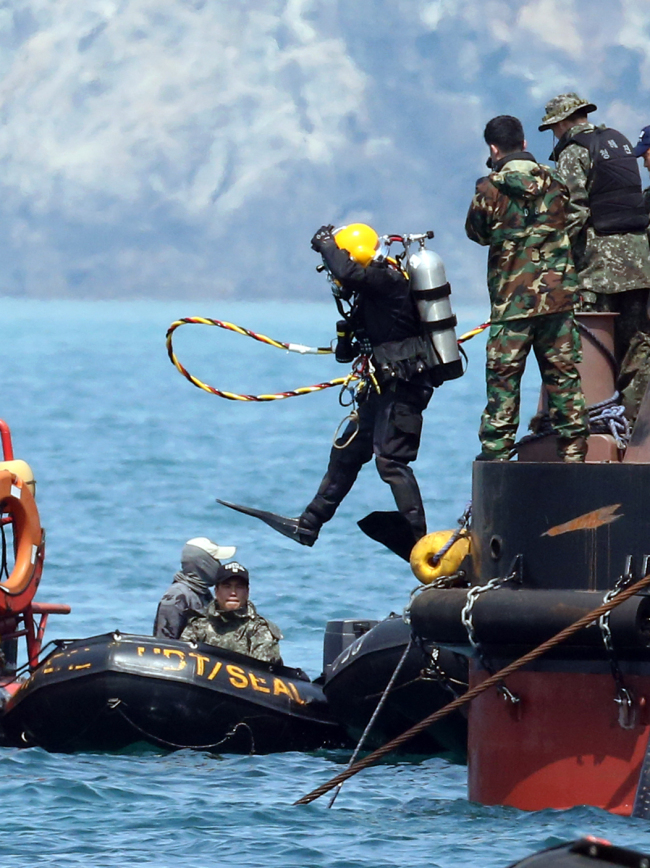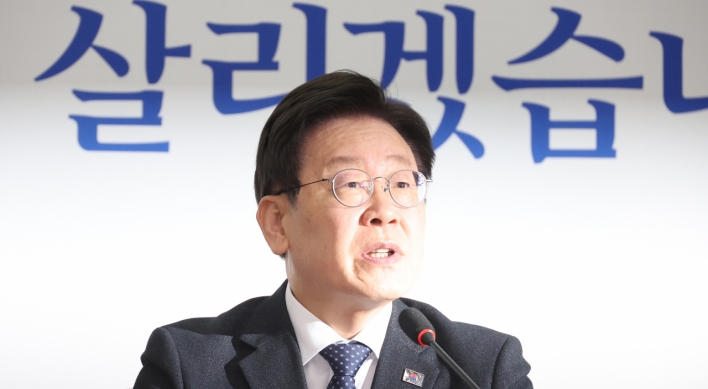[Newsmaker] Medical aid comes late after diver's death
By Yoon Min-sikPublished : May 7, 2014 - 20:46

The government on Wednesday said it had allocated military medical staff to aid divers in the continued search for missing people in the sunken Sewol ferry.
But criticisms are mounting over why the much-needed help came only after a civilian diver died during the mission.
The 53-year-old diver, identified by his surname Lee, was found unconscious Tuesday morning only 11 minutes after entering the water. He died while being treated at a hospital in Mokpo, South Jeolla Province.
Lee was working with Undine Marine Industries Co., the controversy-plagued salvage company in charge of the search operations.
While the exact cause of his death has yet to been confirmed, testimonies about the divers’ poor working conditions have emerged. They are fueling suspicion that the government is hastily deploying the civilians to the scene without proper equipment or safety precautions.
In the wake of Lee’s death, it was revealed that no medical staff were standing by on the barge where divers had been conducting the operation.
As of Tuesday, 17 divers have sustained injuries or suffered from decompression sickness, which affects deep-sea divers who resurface too quickly or stay underwater for too long.
“Right now, divers are in an extreme environment. They have to go inside the ship day and night and haul bodies. Even for trained soldiers, that induces considerable fear,” said Kim Do-hyun, the president of a group of former navy divers.
The government is also under fire for only conducting a brief health check-up before letting the divers go into the water.
An unnamed member of the search team told media that Lee’s heavy build appeared unfit for deep-sea diving. “When I found Lee, he was not wearing a mask or weight belt. Large people can experience problems while deep-sea diving, even when wearing a mask.”
Koh Myung-suk, a spokesman of the pan-government response team, said many of the civilian divers deployed at the scene did not even have insurance.
“When the Coast Guard asks for new divers, it doesn’t specify qualifications. It just says how many additional divers it needs,” he said. “For future dives, we will conduct thorough safety training and put in place medical staff specialized in decompression sickness.”
Government support aside, the fact remains that the ocean floors on which the Sewol sits are a hostile environment for the divers.
“Imagine going into the waters with a water cannon being shot in your face. The divers have to hold the safety line in one hand and use his or her equipment with the other to find the missing people. The cold water also prevents them from staying under the surface for too long,” said Hwang Dae-shik, head of the Maritime Rescue and Salvage Association.
By Yoon Min-sik (minsikyoon@heraldcorp.com)
But criticisms are mounting over why the much-needed help came only after a civilian diver died during the mission.
The 53-year-old diver, identified by his surname Lee, was found unconscious Tuesday morning only 11 minutes after entering the water. He died while being treated at a hospital in Mokpo, South Jeolla Province.
Lee was working with Undine Marine Industries Co., the controversy-plagued salvage company in charge of the search operations.
While the exact cause of his death has yet to been confirmed, testimonies about the divers’ poor working conditions have emerged. They are fueling suspicion that the government is hastily deploying the civilians to the scene without proper equipment or safety precautions.
In the wake of Lee’s death, it was revealed that no medical staff were standing by on the barge where divers had been conducting the operation.
As of Tuesday, 17 divers have sustained injuries or suffered from decompression sickness, which affects deep-sea divers who resurface too quickly or stay underwater for too long.
“Right now, divers are in an extreme environment. They have to go inside the ship day and night and haul bodies. Even for trained soldiers, that induces considerable fear,” said Kim Do-hyun, the president of a group of former navy divers.
The government is also under fire for only conducting a brief health check-up before letting the divers go into the water.
An unnamed member of the search team told media that Lee’s heavy build appeared unfit for deep-sea diving. “When I found Lee, he was not wearing a mask or weight belt. Large people can experience problems while deep-sea diving, even when wearing a mask.”
Koh Myung-suk, a spokesman of the pan-government response team, said many of the civilian divers deployed at the scene did not even have insurance.
“When the Coast Guard asks for new divers, it doesn’t specify qualifications. It just says how many additional divers it needs,” he said. “For future dives, we will conduct thorough safety training and put in place medical staff specialized in decompression sickness.”
Government support aside, the fact remains that the ocean floors on which the Sewol sits are a hostile environment for the divers.
“Imagine going into the waters with a water cannon being shot in your face. The divers have to hold the safety line in one hand and use his or her equipment with the other to find the missing people. The cold water also prevents them from staying under the surface for too long,” said Hwang Dae-shik, head of the Maritime Rescue and Salvage Association.
By Yoon Min-sik (minsikyoon@heraldcorp.com)







![[Hello India] Hyundai Motor vows to boost 'clean mobility' in India](http://res.heraldm.com/phpwas/restmb_idxmake.php?idx=644&simg=/content/image/2024/04/25/20240425050672_0.jpg&u=)










